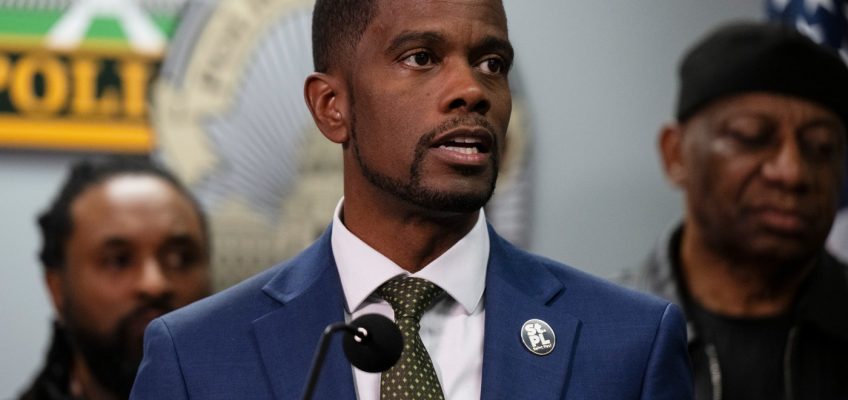St. Paul Mayor Melvin Carter has issued a series of rare line-item vetoes to the city budget approved last week by the city council, canceling nearly $2 million in spending that had been set aside to remodel city council offices.
Carter’s goal, instead, is to use that and additional savings to preserve funding for the St. Paul Police Department, which faced cuts to overtime spending, and fund a director-level position for the city’s Department of Human Rights and Equal Economic Opportunity.
The council, in anticipation of a budget veto, had already scheduled a special meeting for 4 p.m. Thursday, with the goal of voting on a likely veto override. It’s unclear, however, if the seven-member council still retains that legal authority.
Carter’s 11th-hour veto was issued Wednesday afternoon, which the mayor described in a five-page letter to the council as the last possible day that the members could finalize the 2025 budget. The city charter requires final council action on the budget “not later than 12 days” before the state records the city’s new tax levy. The Minnesota Department of Revenue has said all final levy numbers are due to the state by Dec. 30.
“Upon completion of a standard review of your adopted 2025 budget, staff in our City’s Office of Financial Services have identified significant issues, principally including the use of $2,396,503 in unattainable savings to finance core city operations,” wrote the mayor, in his letter.
“As the legal deadline for final decisions pertaining to next year’s budget is established by City Charter … the City Council has effectively run out the clock on its own ability to cure these deficiencies, leaving administrative action as our only remaining option,” Carter added.
Planned cuts restored, but hiring and spending freeze looms
The budget approved by the council last week holds the next property tax levy to 5.9%, less than the 7.9% increase the mayor proposed in August.
To get there, the council’s 2025 budget includes $1.2 million in cuts to planned police funding, with council documents identifying “non-emergency police overtime” as the likely source.
The mayor’s office, in a statement issued Thursday, noted that the primary drivers of overtime expenses are “essential and required tasks, such as back-filling patrol shifts for officers away on military or medical leave, pursuing time-sensitive investigations, and testifying in criminal trials.”
Carter wrote in his letter: “As these are essential and required services, this reduction cannot be realized as actual savings.”
Other line-item vetoes
In addition to vetoing $1.8 million in planned spending to renovate the council chambers, the mayor issued three additional line-item vetoes of new proposed spending, with the goal of adding back funding for a new director for the Department of Human Rights and Equal Economic Opportunity, which has been run for years by deputy staffers.
The council, in the budget approved last week, had dropping funding for the long-vacant position, a director-level role the mayor noted is required by the city’s Home Rule charter. Council members noted the city has not begun the hiring process for that job, but the mayor emphasized that under the charter, it’s the council’s obligation to commence it.
In all, the mayor vetoed $1.9 million for the council chambers redesign project, $160,000 to assist street festivals with security costs, $50,000 for the council’s audit committee and $15,000 for the St. Paul Children’s Collaborative. He also vetoed the decision to eliminate $227,000 from his budget for the Human Rights director.
The mayor also reiterated his concerns that the council budget was effectively impossible to roll out as planned.
Carter called the council’s decision to save $856,000 through attrition, or unfilled positions, impractical, noting the council’s request to exclude police, fire, libraries, and parks and recreation from those impacts would be unrealistic. The four departments represent the majority of city spending, at least through the general fund.
The mayor noted that the council’s decision to cut $50,000 in storm sewer spending could threaten the sewer fund’s credit rating. A downgrade from a credit rating of AAA to AA+ would increase interest charges by approximately three times the savings, he wrote, exposing the fund to $1.55 million in potential additional charges to save $500,000 over 10 years.
Carter said he has directed city department leaders to prepare to freeze new hiring and “contracted expenses across every city function,” including any new spending planned for 2025, “which will likely remain in effect until final determination has been made on a full set of service reductions necessary to meet the bottom lines in the City Council’s adopted budget.”
Carter said he shared alarm “about the squeeze residential property taxpayers are feeling between rising residential values and decreasing values for apartment and office buildings,” he wrote. “We cannot cut our way out of these cycles; the fact that this challenge is not unique to our city only underscores our urgent need to invest. This same concern drives my conviction that right now is a poor time to disinvest in public safety, downtown revitalization, and public infrastructure.”
This is the third time Carter has issued a veto in his seven years as mayor.
Related Articles
Letters: We need more data to know if TIF is working for St. Paul
What’s in St. Paul’s 2025 budget? Here are 10 things to know about it
St. Paul City Council rejects mayor’s budget compromise, holds tax levy to 5.9%
Letter to the Editor: The St. Paul City Council has the ultimate authority to set the city budget
St. Paul mayor says council budget cuts could hurt police response


Leave a Reply